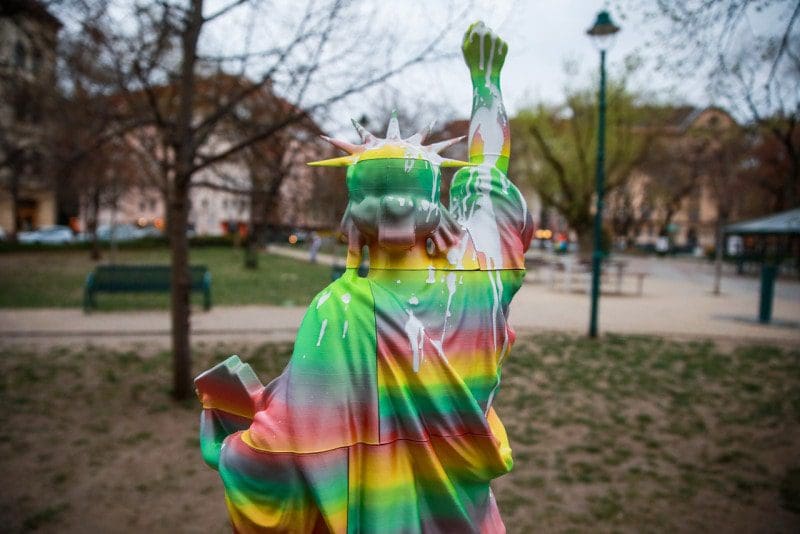As we mark the first anniversary of George Floyd’s tragic death in Minneapolis (which sparked world-wide protests and violent riots in multiple American cities) we might wonder why a similar movement has not gained traction in Hungary and why the message of Black Lives Matter (BLM) does not seem to resonate with most Hungarians.
It has been a year since the otherwise irrelevant career-criminal, George Floyd rose to martyrdom by the hands of a police officer and the resulting shockwave was felt not only in every part of the US, but travelled around the world igniting the flames of racial solidarity in almost every European country and many non-Western ones, as well. However, even though we could hear some limited voices here in Hungary, the wider population seemed completely unaffected by the events happening in Minneapolis.
Now, there are several reasons behind that, some are quite obvious and some are less so. Of course, one might think that you need a sizable population of African descent to really kick off Black Lives Matter protests in a certain country. This is the most obvious reason behind Hungary’s lack of BLM marches (having a black population of a couple thousand at best), but not the only one. Throughout Europe—especially the Western countries—massive solidarity protests were held during the summer even in cities with relatively few African people, attended by thousands of ethnic whites. Just in Germany, more than a hundred thousand people protested racism and discrimination in over 40 cities.
In Hungary, on the other hand, we only had two protests
—if you can call them that—and only in Budapest. The first was attended by a thousand people or so, while the second drew a crowd less than a third of that—a measly number in a city that size. Judging from the fact that a lot of Hungarians changed their profile pictures to the black square of BLM following the George Floyd incident, one would assume that more people would gather to protest as well, but that is not what happened. For most, virtue signalling does not go as far as to actually take the streets, it seems. Hic Rhodus, hic salta – they would have been told in Greece.
Apart from these “protests”, there were some minor incidents, as well. Winston’s Churchill’s bust, for example, was vandalised in the Budapest City Park. The perpetrators presumably got their ideas from their British counterparts when they painted ‘Nazi’ and ‘BLM’ on the bust, caring much less about the historical reality of the prime minister in question. Then, a few months ago a temporary statue honouring the Black Lives Matter movement was erected on a small Budapest square, drawing maybe too much attention. It depicted a rainbow-coloured, kneeling Statue of Liberty with a raised fist, signalling the intersectional nature of identity politics. Within hours it had been vandalized and covered up by locals, and was finally destroyed the next morning despite the visible police presence in the area.
It is clear that Hungary has rejected the Black Lives Matter movement, but why is that exactly? One might easily argue that Hungarians are inherently racist and xenophobic, what else did we expect? Well, for those of us who actually have black friends living in the country, it is much less simple. In a recent interview, for example, Stanley Ward (the Afro-American professor who has been living in Budapest some time now) told the reporter that he has never felt nearly as much hostility and prejudice in Hungary as back in the States.
I think it is the same reason why other movements rooted from identity politics perform so bad in the country in Central Europe in general: the trauma of communism. It is no accident that postmodern social currents are often described as cultural-Marxism, because their essence is the same. Current identity politics uses the same totalitarian tools as communism or Nazism did in the twentieth century, albeit in a more subtle manner. Indoctrination, intimidation and censorship are all part of the toolbox of today’s left and help enforcing its cultural and social narratives. Central Europeans need no lecture about totalitarianism (as long as we do not let ourselves forget it). But for now, Hungarians as a society—maybe not even consciously—can naturally feel that there is something about identity politics that reminds them of their distant memories of an oppressive regime.
So, if Hungarians are not particularly racist, then why don’t they care about BLM?
And the core of the BLM is just that. It promotes a twisted victim-narrative, which feels particularly alien for Hungarians. Its rhetoric implies that white people or Europeans had all been colonizing imperialist oppressors in the past while people of colour all suffered equally by their hands. The obvious historical fallacy of this assertion does not need to be addressed, and especially for most nations of Central Europe, who really had never been in the position to colonize anyone, but had been conquered instead by other empires. Be it the Turks, the Germans or the Russians, we all had our fair share of “colonizers”. And now this movement tells us to feel sorry for the collective crimes of our past and threatens with cancel culture if dare to call out the nonsense. No, Hungary just would not take it.
The Black Lives Matter movement could not take roots in Hungary not just because there are no black people here (after all, the Roma could have taken up the flag, but they did not), and certainly not because Hungarians are so racist that they did not even let the movement be born. Instead, it is because we have seen this before. It is enough for us to catch a whiff of totalitarianism—wearing the disguise of whatever fancy postmodern movement—and we know that we do not want it. Four and a half decades of communism was more than enough to inoculate Central Europe against any kind of oppressors of individual freedom.
The only question that remains is that how long we have left until no one remembers what it was like back then, before 1989? If that point arrives, BLM and other movements of identity politics will finally take hold of Central Europe, as well. There is only one thing we can do to avert that: remember what happened to past generations and share it with those of the future.








